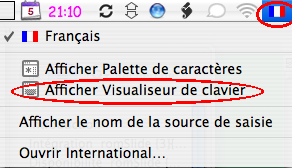8.8. FAQ
8.8.1. MacOS X how to
- ... Where is that damn character? ( “{” or “~” or “]” etc. )
Most common hidden characters:
character key combination { Atl-( } Alt-) [ Alt-Shift-( ] Alt-Shift-) ~ Alt-n-space | Alt-Shift-L button 2 Control-click button 3 Apple-click \ Alt-Shift-/`
8.8.2. Unix questions
- ... My executable is there, and yet I have the following error:
$> myExecutable.exe zsh: command not found: myExecutable.exe
The simplest is to designate the executable by its relative path:
$> ./monExecutable.exewhere ”.” means the current directory.
8.8.3. C++/STL questions
- ... What is this story about std::?
- All the C++ standard library is defined in its own namespace, the namespace std. Thus, we must always use the prefix std:: before all the elements that are drawn.
- ... How to convert a std::string into an integer?
Using istringstream :
#include <sstream> int main() { std::istringstream is( "1" ); int nombre; is >> nombre; return 0; }
- ... And convert an integer to a std::string ?
Using ostringstream :
#include <sstream> int main() { std::ostringstream os; os << 1; std::string nbre_str = os.str(); return 0; }
- ... And convert a std::string into a const char* ?
By using the method c_str() . For example:
#include <string> int main () { std::string filename = "../data/formes.txt"; std::ifstream f f.open( filename.c_str() ); ... return 0; }
- ... I have more unanswered questions!
- Some of the answers given above are taken from the FAQ C++ - Club d’entraide des développeurs francophones (licensed under the GNU FDL)
8.8.4. The 4 basic commands for CMT
- ... cmt create <package> <version>
- creates and configures a new package
- ... cmt config
- creates setup and cleanup files
- ... cmt show uses
- shows all packages used by CMT
- ... source setup.sh/.csh in cmt directory
- updates the CMT environment variables
For more informations, see cmt help
8.8.5. The 5 basic commands for Subversion
- ... svn checkout URL[@REV] [PATH] / svn co URL[@REV] [PATH]
- recopies localy in the directory PATH a repository located at URL.
- ... svn status / svn st
- compares the content of the current directory with regard to the repository and displays the differences.
- ... svn update [PATH] / svn up [PATH]
brings up the modifications from the repository PATH into the local directory.
Warning
Every single svn update must follow an svn status to check the state of our directory with regard to the repository.
- ... svn add [PATH]
adds the file(s) or directory PATH to the repository.
Warning
Every single svn add must follow an svn commit so the repository is up-to-date.
- ... svn commit [PATH] -m”[msg]” / svn ci [PATH] -m”[msg]”
sends over to the repository all the local modifications applied to the directory (or file) PATH.
Warning
Every single svn commit must follow an svn status to check the state of our local copy with regard to the repository.
For more informations, see svn help
